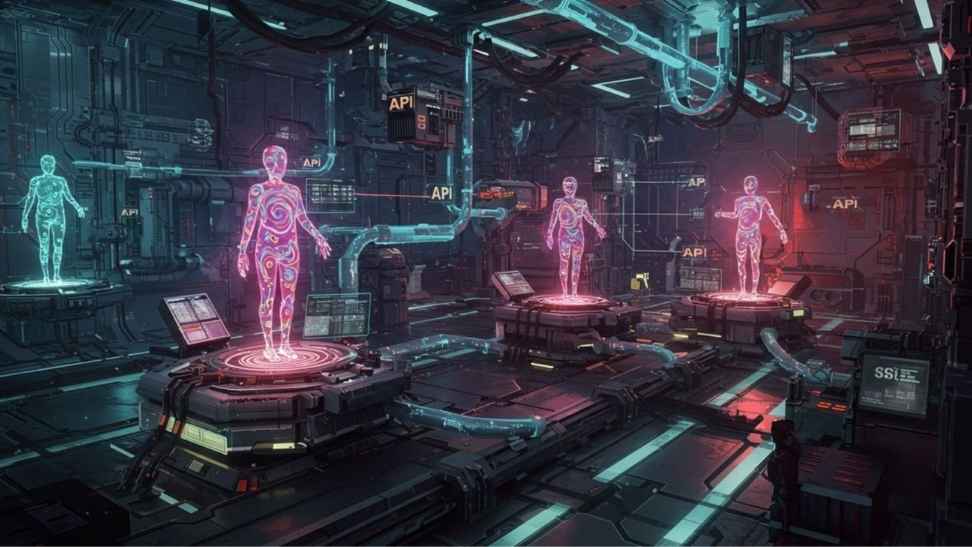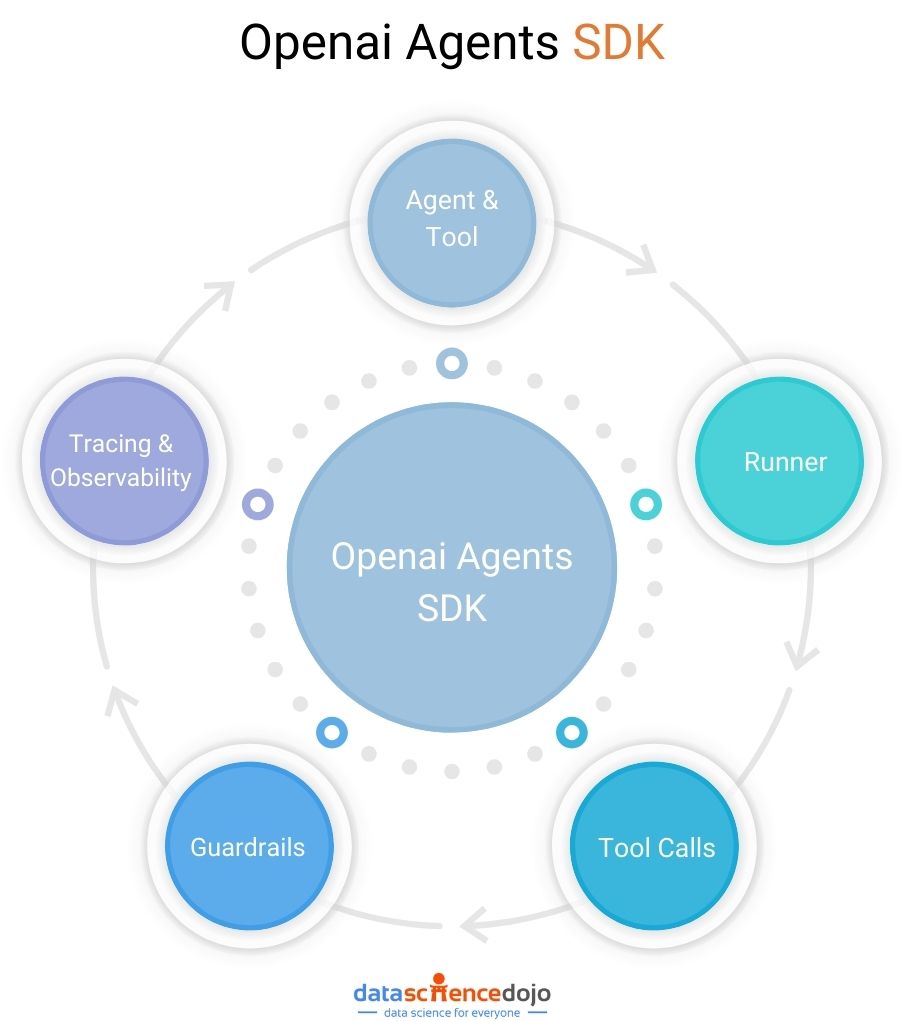Agentic AI marks a shift in how we think about artificial intelligence. Rather than being passive responders to prompts, agents are empowered thinkers and doers, capable of:
-
Analyzing and understanding complex tasks.
-
Planning and decomposing tasks into manageable steps.
-
Executing actions, invoking external tools, and adjusting strategies on the fly.
Yet, converting these sophisticated capabilities into scalable, reliable applications is nontrivial. That’s where the OpenAI Agents SDK shines. It serves as a trusted toolkit, giving developers modular primitives like tools, sessions, guardrails, and workflows—so you can focus on solving real problems, not reinventing orchestration logic.
Introduction to the OpenAI Agents SDK
Released in March 2025, the OpenAI Agents SDK is a lightweight, Python-first open-source framework built to orchestrate agentic workflows seamlessly. It’s designed around two guiding principles:
-
Minimalism with power: fewer abstractions, faster learning.
-
Opinionated defaults with room for flexibility: ready to use out of the box, but highly customizable.
With this SDK, developers gain:
-
Agent loops: Automatic orchestration cycles—prompt → tool call → reasoning → loop end.
-
Tool integration: Schema-validated Python functions, hosted capabilities, or other agents.
-
Guardrails: Structured validation to keep your AI’s input and output grounded.
-
Sessions: Built-in handling of conversation history—no manual state juggling.
-
Tracing: Rich execution insights with traces and spans, ideal for debugging and monitoring.
-
Handoffs: Compose multi-agent workflows by letting agents pass tasks dynamically.
Core Concepts of the OpenAI Agents SDK
Understanding the SDK’s architecture is crucial for effective agentic AI development. Here are the main components:
Agent
The Agent is the brain of your application. It defines instructions, memory, tools, and behavior. Think of it as a self-contained entity that listens, thinks, and acts. An agent doesn’t just generate text—it reasons through tasks and decides when to invoke tools.
Tool
Tools are how agents extend their capabilities. A tool can be a Python function (like searching a database) or an external API (like Notion, GitHub, or Slack). Tools are registered with metadata—name, input/output schema, and documentation—so that agents know when and how to use them.
Runner
The Runner manages execution. It’s like the conductor of an orchestra—receiving user input, handling retries, choosing tools, and streaming responses back.
ToolCall & ToolResponse
Instead of messy string passing, the SDK uses structured classes for agent-tool interactions. This ensures reliable communication and predictable error handling.
Guardrails
Guardrails enforce safety and reliability. For example, if an agent is tasked with booking a flight, a guardrail could ensure that the date format is valid before executing the action. This prevents runaway errors and unsafe outputs.
Tracing & Observability
One of the hardest parts of agentic systems is debugging. Tracing provides visual and textual insights into what the agent is doing—why it picked a certain tool, what inputs were passed, and where things failed.
Multi-Agent Workflows
Complex tasks often require collaboration. The SDK lets you compose multi-agent workflows, where one agent can hand off tasks to another. For instance, a “Research Agent” could gather data, then hand it off to a “Writer Agent” for report generation.

Setting Up the OpenAI Agents SDK
Prerequisites
- Python 3.8+
- OpenAI API key (
OPENAI_API_KEY) - (Optional) Composio MCP tool URLs for external integrations
Installation
For visualization and tracing features:
For MCP tool integration:
Environment Setup
Create a .env file:
OPENAI_API_KEY=sk-...
Load environment variables in your script:
Example: Hello World Agent
Here’s a minimal example using the OpenAI Agents SDK:
Output:
A creative haiku generated by the agent.
This “hello world” example highlights the simplicity of the SDK, you get agent loops, tool orchestration, and state handling without extra boilerplate.
Working with Tools Using the API
Tools extend agent capabilities by allowing them to interact with external systems. You can wrap any Python function as a tool using the function_tool decorator, or connect to MCP-compliant servers for remote tools.
Local Python Tool Example
Connecting MCP Tools (e.g., GitHub, Notion)
Guardrails Options
Guardrails are essential for safe, reliable agentic AI. The SDK supports:
-
Input Guardrails:
Validate or moderate user input before agent execution.
-
Output Guardrails:
Validate or moderate agent output before returning to the user.
-
Moderation API:
Filter unsafe content automatically.
-
Custom Logic:
Enforce business rules, PII detection, or schema validation.
Example: Input Guardrail
Combine retrieval-augmented generation with agentic workflows for smarter, context-aware AI agents.
Tracing and Observability Features
The OpenAI Agents SDK includes robust tracing and observability tools:
Visual DAGs:
Visualize agent workflows and tool calls.
Execution Logs:
Track agent decisions, tool usage, and errors.
Integration:
Export traces to platforms like Logfire, AgentOps, or OpenTelemetry.
Debugging:
Pinpoint bottlenecks and optimize performance.
Enable Visualization:
Multi-Agent Workflows
The SDK supports orchestrating multiple agents for collaborative, modular workflows. Agents can delegate tasks (handoffs), chain outputs, or operate in parallel.
Example: Language Routing Workflow
Use Cases:
- Automated research and analysis
- Customer support with escalation
- Data pipeline orchestration
- Personalized recommendations
Conclusion
The OpenAI Agents SDK is a powerful, production-ready toolkit for agentic AI development. By leveraging its modular architecture, tool integrations, guardrails, tracing, and multi-agent orchestration, developers can build reliable, scalable agents for real-world tasks.
Ready to build agentic AI?
Explore more at Data Science Dojo’s blog and start your journey with the OpenAI Agents SDK.


